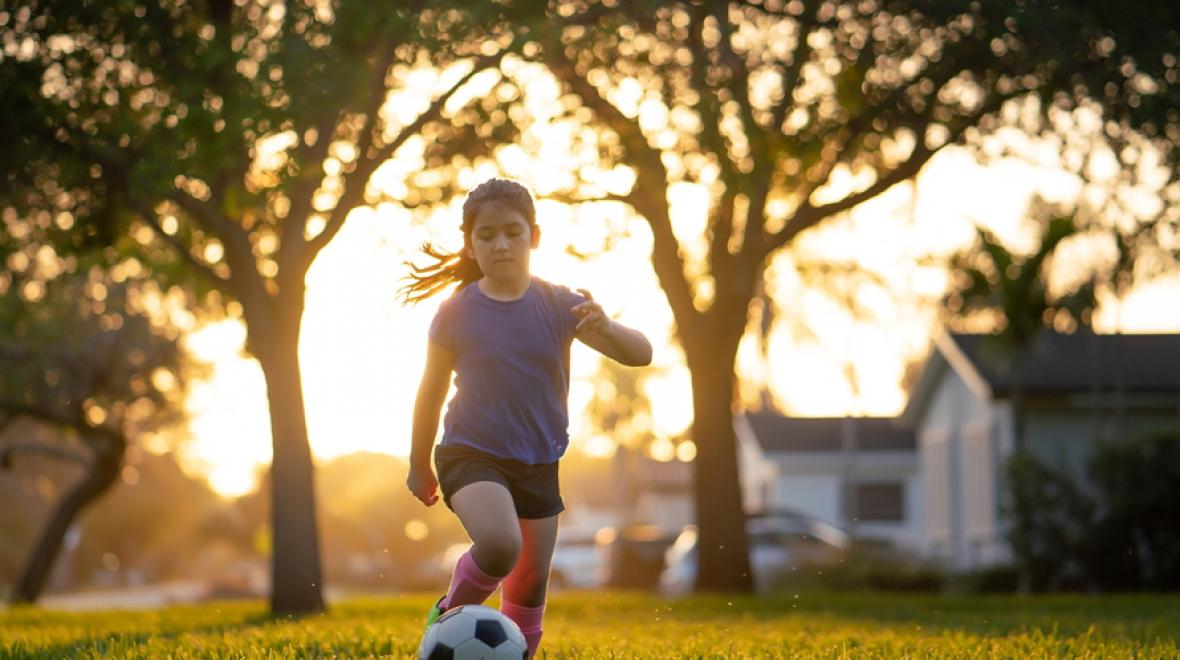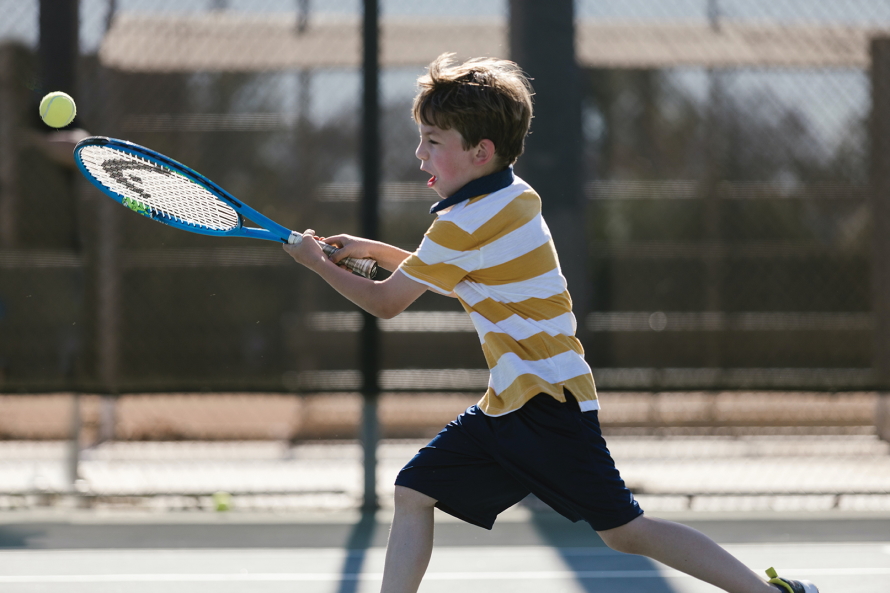
See if this scenario sounds familiar: You are sitting on a blanket spread out at the edge of the field, feeling a knot in your stomach the size of the soccer ball, as you watch your child reluctantly dribble the actual ball across the grass. They have practiced all summer, but controlling the ball is still difficult for them. A group of kids who couldn’t contrast more with your child engage in excited chatter and horseplay at the center of the field. You suspect that once your child reaches them, he will bow his head (because eye contact is uncomfortable) and stand back (due to all of the noise and commotion), making his difference from the rest of the players that much more obvious.
You want to be excited to see your child finally put their hard work into practice, to show your pride about the risk they took to even come out today, but you’re worrying instead that practice might start with a meltdown. You’re thinking about the effort it required to even get there in the first place, how you helped your preteen child — who had been yelling in frustration for at least five minutes before you intervened — pull on impossibly tight soccer socks; tried to convince them that shin guards were, in fact, mandatory; and gave your best pep talk in the car while noticing that you were already late for this, the first day of practice.
The coach will soon see that your family is always running five–10 minutes behind, no matter how much you juggle schedules around. Leaving your house is time-consuming and unpredictable every time, and anyway, there seems to be no way to explain your unpunctuality without divulging your child’s diagnosis. You look around with some envy at the other parents who are talking amongst themselves or staring at their phones, rather than watching the field like a hawk for the first sign of trouble.
You wonder whether your child should continue this season and whether they will have any fun at all.…
Sports are considered by many parents to be a childhood rite of passage. But neurodivergent (ND) children — those with a neurological difference, such as ASD, ADHD or anxiety — often have difficulty participating in team sports in particular. These kids might experience great distress and difficulty in spite of being physically capable, and can drop out early or even refuse to try a sport at all. As a result, they are missing out on an experience many parents feel is important to developing qualities such as perseverance, teamwork and confidence, not to mention sport-specific skills.
Kids with neurodivergence are constantly confronting challenges on many levels simultaneously. ADHD, for example, can affect emotional regulation, making feelings triggered by winning and losing all the more difficult to manage. Many neurodivergent children also might find the playing environment to be overstimulating and/or overwhelming.
Autistic children might misread social cues or communicate in ways that are not neurotypical and thus may be misunderstood by neurotypical peers and coaches. Challenges with motor skills are another common obstacle for ND kids to developing the skills needed to play alongside their neurotypical peers.
All of these children could benefit from more frequent breaks during practice or require different coaching approaches that emphasize praise for effort, positive reinforcement, and acceptance of their unique traits and behaviors. For these reasons alone, and for many others, the thought of sending your neurodivergent child out onto the field or court for a competitive game might send you into full-blown panic mode. At the same time, neurodivergent kids can benefit immensely from, and even enjoy and excel at, sports. Moreover, regular exercise is frequently recommended as a treatment, especially for ADHD. As the parent of an ND child with advanced athletic skills, I have developed some strategies over our more than seven years of experience in both individual and team sports. These tactics will help you to not only participate in sporting activities, but also have fun doing it!
1. Communicate openly with your coaches.
I’m not suggesting that you share all, or even part, of your child’s diagnosis with their coach. Instead, consider writing an email or having a quick chat with the coach before the first practice about which strategies seem to work best for your child. You could simply share that your child benefits from clear direction and frequent breaks, or you can more directly address specific challenges your child might have, such as rejection sensitive dysphoria (common with ADHD), a state of extreme emotional sensitivity triggered in children when they perceive they have been rejected or criticized by peers or adults that might result in them lashing out verbally or shutting down altogether. A parent who has experienced this scenario might offer suggestions to the coach for what has worked in similar situations for their child when these episodes have occurred at home or school.
For years, I did not mention my child’s neurodivergence, and my nondisclosure had consequences ranging from confusion about unexpected behavior to near disaster when my child panicked in deep water and needed to be rescued by a lifeguard not once, but twice, during the same group swimming lesson session. Whatever might have been the reason for my silence, I now write an email to the coach, instructor or program administrator prior to every season or lesson. As a result, our experience has been much smoother.
2. Consider more ‘individualized’ or solo sports.
Parents of ND kids often recommend trying sports that rely on individual performance, such as tennis, fencing, golf, ice skating, skiing or swimming, to name a few. These athletes do sometimes compete as a team, but the actual race or competition is often endeavored alone in a pool, on the slopes and in other arenas.
Solo sports can alleviate the additional pressure neurodivergent children might feel when interacting with a larger team, pressure that can overwhelm their senses or outstrip their ability in the moment to communicate or interact with peers.

3. Look for adaptive lessons and supportive environments.
Adaptive lessons are designed for children with disabilities who require one-on-one, specialized instruction, including kids with neurological differences. This support is most frequently available in sports such as downhill skiing or swimming, and often only at larger resorts or learning centers.
A parent of a young neurodivergent skier testifies to the difference that adaptive lessons made for their child: “He’s athletic, with endless energy, and a very good skier. We did [an adaptive] lesson, and he was in heaven because he didn’t have to wait for anyone and could do black trails. But they don’t have availability every day. We’ve tried other options, and none seem to be a fit [for him]. He loves skiing, and it seems to be very calming for him. The stimulus of lots of people and having to wait and not do things according to his plan causes him problems though.”
Private or small-group instruction also might be needed in sports for which there are safety concerns in a larger group setting, such as swimming. When cost and availability of private or adaptive instruction are barriers, look for support in sports programs emphasizing skill acquisition over competition, such as those offered by a parks and recreation department or YMCA facility, or through an organization such as Outdoors for All. This volunteer-run nonprofit delivers adaptive and therapeutic recreation for more than 3,000 children and adults with disabilities every year.
Once your child has gained more skills and adjusted to the expectations of team sports, you might feel ready to try a “competitive” program.
4. Prioritize sports in your busy family schedule.
For ND children in particular, appointments with essential providers, such as a speech-language pathologist, occupational therapist or counselor, seem to overfill the family schedule, leaving little time for participation in after-school activities. Parents often wait many months (and maybe even a year or longer) for those coveted time slots and know that they can’t be easily changed, if rescheduled at all. All the same, notify your child’s providers well in advance (i.e., as many months in advance as possible) of the start of the upcoming sports season about potential conflicts, emphasizing the importance of sports to the social and emotional, not just physical, development of your child.
Likewise, speak with your child’s coach and/or the sponsoring organization about your family’s schedule. Some teams practice later in the day, especially starting in the middle school years. You might find more opportunity for schedules to align than you anticipate.
5. Remember the special experiences and assets that your ND child brings to athletics.
Finally, don’t forget the special gifts bestowed by your child’s neurodivergence. ADHD kids are often the most energetic and enthusiastic of teammates! Autistic children can show remarkable dedication for, and perseverance in, their special interests, including athletics.
All neurodivergent children have confronted obstacles and overcome challenges in their daily lives and at school, and these experiences will serve them well in their sport endeavors. You might find that it is your child who kicks the ball the hardest, supports their teammates with the most passionate loyalty, or smiles the widest whether they win or lose.
Don’t underestimate your ND athlete; get out there, knowing you’ve set the stage for success, and watch them have fun!











